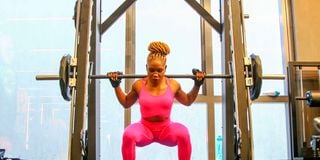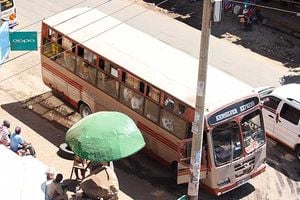Body tans, strict diet, expensive bikini: The life of a female bodybuilder

What you need to know:
- The former Nangina Primary School and Alliance Girls High School student holds a Bachelor’s degree in commerce.
- Caren was an attaché at Parliament of Kenya and worked as an audit assistant and later as an accountant before she switched to fitness.
- Her major triumphs in bodybuilding include winning the MR001 Bodybuilding tournament in Mombasa in 2021 and clinching the Miss East Africa Natural BodyBuilding title in the Women Figure category in 2022.
Caren Namenya Mulyanga describes herself as a self-driven individual who is passionate about developing her career as a fitness trainer and bodybuilder. She is a trained and certified fitness and nutrition coach.
How did this bodybuilding journey all begin?
I started working out in early 2019 just to stay healthy and fit, and also to add a bit of weight because I was so small. I just wanted to look good. But later that year, when my mum passed away, life got a little hectic. For the better part of that year I went to the gym just because I needed a little bit of distraction. When coronavirus came in 2020, we were mostly working from home. I was an accountant by that time, but I decided to take up a fitness course, then I switched careers from accounting, to training and bodybuilding. My first bodybuilding show was the Iron Fit Classic on September 12, 2020. I later did an online fitness course on training and nutrition.
Juggling accounting and bodybuilding must be challenging, how do you do it?
I had to quit my job as an accountant to concentrate on fitness full time. The good thing is, I had the best support, so in the course of transitioning I met one bodybuilder in Kenya called Meshack Ochieng who reached out to me after seeing me in competition. He told me “Your physique is good, I think we can work with you”. So I started working with him, then he referred me to Rashid Gift Issa of Fitness Empire Gym in Eastleigh. While I was there, I got a job as a trainer at Afrique Gym in South B. That's where I started working as a trainer. In the course of 2021, I entered three competitions – Kamukunji Annual Talent search in March, Misuli Festival in July and Mr 001 in December. Toward the end of 2021, AfroFit gym was coming up and the boss was looking for a personal trainer, so I applied for the position. I started working at AfroFit in January 2022 as a floor trainer when it officially opened.
What benefits have you seen so far in bodybuilding?
I have learnt a lot and grown both personally and as a trainer. In 2022, I took part in four competitions and won all that happened in Kenya. I came third in South Africa and earned an elite pro card which internationally acknowledges you as a bodybuilder. At AfroFit, we also have floor trainers who help the clients coming to the gym. Towards the end of last year, I was asked to be an independent trainer, so currently I’m a personal trainer at AfroFit.
How has your year 2023 been like?
For the first time, I moved from my comfort zone and participated in a different category. I used to participate in the Figure Category, but I decided to enter the Wellness competition and came third. I also made my debut as a pro athlete and competed internationally. I feel this is a different stage for me. It might be challenging, but I’m up to the task.
Was bodybuilding the first sport you ever tried?
No. I used to run the 100 metres dash in primary and high school and also played netball. I used to compete even at the national school games, but my parents kept telling me to concentrate on education.
So your parents were against the idea of you becoming an athlete?
My dad was not so okay with the idea of fitness and all that because at some point people were telling him all manner of things like I’d get hurt, I’d get too muscular, and that the gym is not good for me because I have not yet given birth. We actually had a big disagreement with my dad when I was starting out. We did not speak to each other for a while. After about three shows, I just told him casually that I was going to a competition and that I would see him later. He just nodded, and when I came back with the trophy, he said, “You actually won!” After that, he started getting interested. When I told him I was going for a show in South Africa, he realised I was really serious about the career. Nowadays, he is supportive, and my relatives fell in line after my dad gave me his blessings.
Leaving an accounting job must have been a difficult decision…
I was not really stepping out of a well-paying job, but I was comfortable. After the coronavirus pandemic in 2020, I decided to choose something that I could do anywhere. Although training at the gym still requires me to be physically there, I can do online training with other clients, make programmes, draft nutritional meal plans for online clients and plan my days, which I really enjoy.
What challenges have you encountered as a bodybuilder?
The first is misconception. Everyone thinks that if you go to the gym as a woman, you are going to get muscles like a man. Ours is a male dominated industry and without the right support, you can get frustrated and lonely. It gets to a point where you need people who just understand what you are going through. Not everyone understands what a female bodybuilder goes through. The men have it easier because they have high testosterone levels and all that, so it is easier to balance out the hormones. But, for a female it is like we are working against our physiology. The hormones sometimes become imbalanced and can cause mood swings and low energy. There are times when you can’t eat certain foods, so if you’re not allowed to cook something else it can be very difficult for you.
What are the financial implications in this sport?
Financial support is very important for bodybuilders because fitness is very expensive. I’m lucky to have supportive people such as former Mr Kenya and Mr Africa Meshack Ochieng. I also receive bodybuilding supplements that help me. Right now, I’m trying to partner with an equipment manufacturing company so I can get even more support. Meals and supplements are very expensive, so if you don’t have adequate finances, your body will suffer. Getting ready for the bodybuilding shows need finances because you need to be on a strict diet and training regimen.
Getting ready for the show is also expensive because you need to pay registration fees of between Sh2,000 and Sh50,000. Women must wear make-up and do our hair. The bikinis we wear on stage are very expensive, costing Sh20,000 and above. Shoes go for Sh35,000!
What’s your advice to someone interested in bodybuilding?
First thing to know is you will need money to support your passion. International competitions are very expensive. You have to pay registration fees, and your flight tickets which cost upwards of Sh100,000, as well as accommodation.
On the day of the competition, we usually tan our bodies. In South Africa, that cost around Sh10,000, and in Abu Dhabi it cost between Sh15,000 and Sh20,000. Woe unto you if you don’t know how to do your makeup because you will have to pay someone to do it. We paid around Sh12,000 for makeup in South Africa. In Abu Dhabi, makeup was around Sh40,000. The hair is always an extra cost. Sadly, you can incur all these expenses and still not win. I’d say you have to do it out of passion and be willing to spend without counting your losses.





